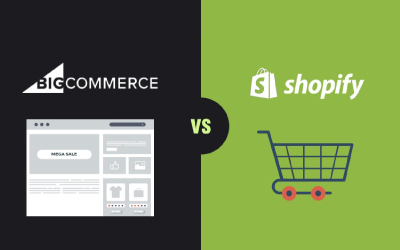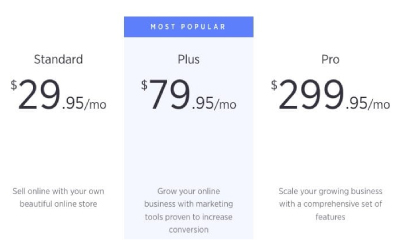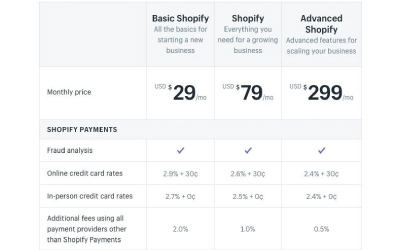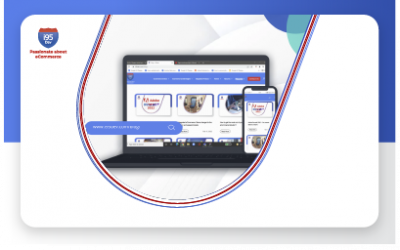BigCommerce vs Shopify: The 2021 Showdown
For Best eCommerce Platform
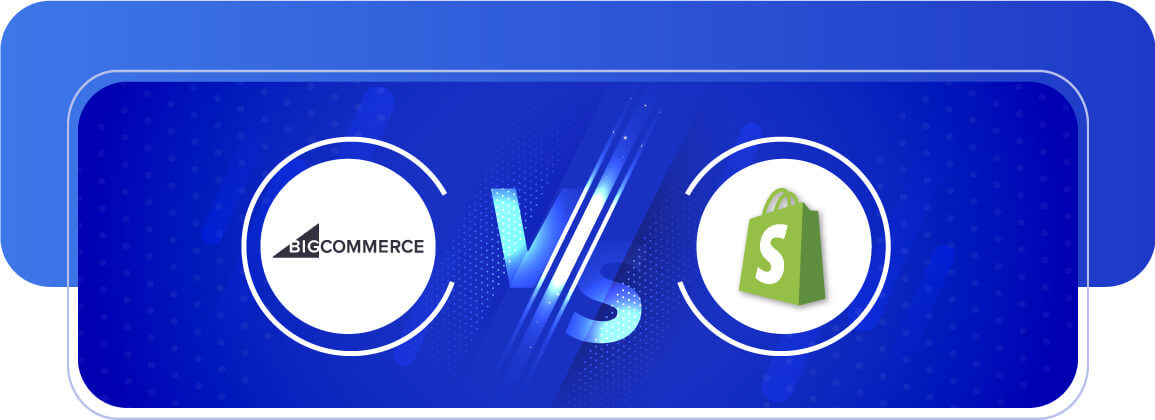
BigCommerce and Shopify are major players in the world of hosted eCommerce software platforms. BigCommerce and Shopify are website builders that allow you to sell products online be it digital or physical. There is no denying that BigCommerce and Shopify both have earned their places on the top of the eCommerce pack. Both are aimed at people who are starting a new online selling business venture without an extensive budget for web development. They allow you to manage your eCommerce store from anywhere as both products run in a web browser.
But choosing either of them as a beginner can be tricky. Let i95Dev’s comparison between the two help you to choose the best eCommerce software solution for your online shop. By the end of this comparison, you should know which of these two products can be the best eCommerce platform for your business.
Pros And Cons Of Shopify-BigCommerce
| BigCommerce Pros | Shopify Pros |
| No transaction fees on any plan | Bigger app store with multiple tools to address common issues |
| Has an incredible amount of built-in sales features, with no need for installations | Vivid theme options to reduce the customization workload on your part |
| Can accommodate upto 600 variations per product | Website management is simple with Shopify’s easy-to-navigate dashboard |
| BigCommerce Cons | Shopify Cons |
| Not a lot of variations between different store themes | Transaction fees apply unless using Shopify Payments |
| A small learning curve is required for advanced features | Poor for international scalability – rely on third-party apps for multi-currency support |
| Features options aren’t as customizable as Shopify’s | Switching templates translates to reformatting your sites |
Which Has Better Pricing
One of the first questions that potential BigCommerce and Shopify users ask is – “How much do they cost?” Let’s take a look at that:
Both BigCommerce and Shopify offer three pricing plans. BigCommerce’s plans range from $29.95/month to $299.95/month. Shopify’s plans range from $29/month to $299/month. Both platforms offer discounts upto 10% if you pay annually instead of monthly.
BigCommerce Pricing
Shopify Pricing
BigCommerce offers a free trial for 15 days, while Shopify provides it for 14 days. Both platforms don’t have much price difference, but it’s all about what tools and features you actually get for the price you pay. BigCommerce depends less on third-party apps than Shopify, which means that more tools will come included in the cost of your BigCommerce store. On the contrary, Shopify helps you to drag and drop elements onto your homepage. But to get that same level of hands-on control for every other page, you have to install other apps like Buildfy for an additional $12.99/month.
Verdict For Pricing Among Shopify Vs BigCommerce
BigCommerce offers more value for money than Shopify, as it has a better selection for built-in tools and a complete lack of transaction fees, making it a clear winner.
Which Is Easiest To Use
Users usually find Shopify easier to use than BigCommerce as it’s features are more scalable and are less suited for beginners. Shopify is a less powerful platform, with Shopify adding products is as simple as filling out a quick form for each item, and there are plenty of pointers along the way. BigCommerce, on the other hand, offers more powerful sales features that require a bit more of a learning curve.
Plus, BigCommerce has recently made some improvements to ease of use; BigCommerce drag-and-drop builder actually outclasses Shopify in terms of design flexibility. You just need to select page elements of your choice and get started.
Meanwhile, in Shopify, you don’t get the same hands-on experience on editing. With Shopify, you can just switch the order of the page elements from a list.
Verdict For Ease Of Use Among BigCommerce Vs Shopify
Shopify is easier to use than BigCommerce, making it the top choice for beginners. BigCommerce is more versatile and powerful, but it’s tough to master.
Which Has Best Sales Features
First things first, both Shopify and BigCommerce offer essential features as:
- An SSL Certificate – SSL means Secure Sockets Layer. This certificate protects your store and validates it as a safe place for online payments.
- Basic Shipping Tools – It sets shipping locations & rates based on weight or order value & prints your own shipping labels.
- Multichannel Selling – Sell across multiple platforms such as instagram, Facebook, Pinterest etc.
So, now what sets these e-commerce platforms different from each other? Any Guesses?
Let us clear this out.
BigCommerce Is Considered Best For Built-In Features
It has an incredible amount of sales features already built-in to your store from the get-go. Its app store is much smaller than Shopify’s store, but it’s because you won’t need to face the trouble of downloading a ton of apps to add functionality to your store. Some useful features that come built-in with BigCommerce that Shopify only offers you through separate apps are
- Real-Time Shipping Quotes From Third-Party Carriers – With this, the customers are provided with the correct & real-time shipping details.
- Ratings & Reviews – It allows customers to provide product reviews directly onsite.
- Unlimited Staff Accounts – Grant access to your site admin to keep as many staff members as you need.
Shopify Is Considered Best For Customizable Features
Adding features with Shopify require greater technical expertise and platform-specific know-how when compared to BigCommerce. Shopify’s app store is considerably larger than BigCommerce store because not only do you have plenty of tools at your disposal. You are also able to pick many more tools which you decide to design your site, whether it’s curbside pickup options or personalized appointment booking forms.
Verdict For Sales Features Among BigCommerce Vs Shopify
Well, it’s a tie! Shopify Sales features are more customizable, but BigCommerce includes more useful features right off the bat. Both offer all the features that an online store will need.
Which One Has The Best Marketing Features
| Marketing Features: BigCommerce | Marketing Features: Shopify |
| One-click Google shopping integration | Analytics for product performance & finance summaries |
| Automatic Site Maps & customizable URLs, title tags & metadata for best SEO practice | Automatic site maps & customizable URLs & headers |
| Ability to create discount codes for shoppers to use | Ability to create discount codes and gift cards |
| Professional reporting tools |
Verdict For Marketing Features Among BigCommerce Vs Shopify
You might seem this silly, but this too is a tie! Both of them are equally great with BigCommerce providing you pre-built sales features and Shopfiy’s ability to cater to your case specific needs.
Summing Up
Overall, when comparing BigCommerce vs. Shopify, it’s hard to pick a clear winner. But, ultimately, they are fairly well-matched store builders, with BigCommerce winning when it comes to product options, reporting, multi-currency selling and SEO, and Shopify coming out on top when it comes to themes abandoned carts recovery, email marketing and integrations with other apps.
If you want built-in features without the hassle of installing or paying for them separately, you have a large inventory and need better product variant options; you want an easy drag-and-drop website design tool than you make go directly for “BigCommerce.”
On the contrary, if you want more control over the website, you want as much choice as possible between third-party apps or you value unique, pre-designed theme options, then you must go straight with “Shopify.”
So finally, the winner is, “The better platform ultimately comes down to what you’re looking for. That said, our testing found Shopify to be the winner for its ease of use, customer support, and template designs.”
If you need any further help choosing the ideal ecommerce platform and BigCommerce-ERP integrations/Shopify-ERP integrations, feel free to contact i95Dev right away.
Recent Blogs
Enhancing Shipping Precision with Custom Shipping Groups in Adobe Commerce/ Magento
Enhancing Shipping Precision with Custom Shipping Groups in Adobe Commerce/ Magento Author Category Share Three things matter the most when it comes to eCommerce shipping: speed, accuracy,...
Managing Massive Product Catalogs: Why Synchronization is the Key to Efficiency
Managing Massive Product Catalogs: Why Synchronization is the Key to Efficiency Author Category Share The automotive aftermarket industry is vast and highly competitive, requiring businesses...
A Complete Guide to Seamlessly Integrating Adobe Commerce with NetSuite
A Complete Guide to Seamlessly Integrating Adobe Commerce with NetSuite Author Category Share Integrating Adobe Commerce (formerly Magento) with NetSuite ERP can transform the way businesses...




